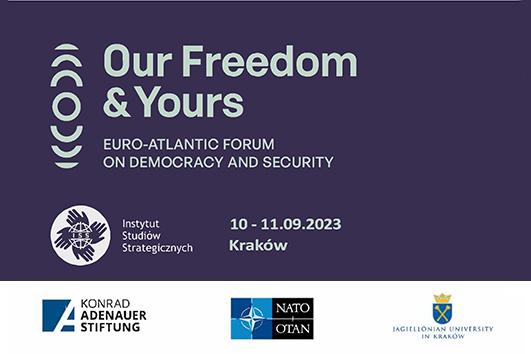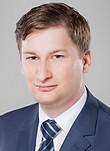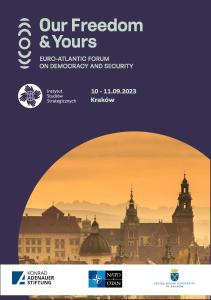Fachkonferenz
Details
Die XXXI. Internationale Krakauer Sicherheitskonferenz mit dem Titel "Euro-Atlantisches Forum für Demokratie und Sicherheit: Unsere Freiheit und Ihre" ist der Analyse und Diskussion der sozialen und geopolitischen Veränderungen gewidmet, die die Demokratien sowohl weltweit als auch in Europa betreffen. Prozesse wie das Aufkommen von Populismus, autoritären Tendenzen und Polarisierung haben die Demokratien im Inneren geschwächt. Sie gehen einher mit externen Bedrohungen durch autokratische Regime, die die liberale internationale Ordnung destabilisieren.
Interne und externe Herausforderungen für die Demokratie und die internationale Ordnung sind eng miteinander verwoben. Allzu oft wurden Phänomene wie populistischer Nationalismus und Kulturkriege so analysiert, als ob sie von der internationalen Arena isoliert wären. Ebenso werden Phänomene wie Handelskriege und Stellvertreterkriege oft untersucht und dargestellt, ohne dass eine eingehende Analyse ihrer internen Zusammenhänge erfolgt. Deshalb ist eine Diskussion über die sich verändernde internationale Ordnung und ihre Auswirkungen auf die demokratischen Gesellschaften sehr aktuell und notwendig.
Offene Gesellschaften haben ihre Feinde, aber sie haben auch die Fähigkeit zur Selbstreflexion. Das Euro-Atlantische Forum für Demokratie und Sicherheit: Our Freedom and Yours bietet eine Plattform für den Austausch von Ideen und Ansichten.
Die anhaltenden gesellschaftlichen Prozesse, die zu einem schwindenden Vertrauen in die liberale Demokratie führen, fallen mit einer wachsenden Atmosphäre der Unsicherheit zusammen, die auf eine Reihe von transnationalen Faktoren zurückzuführen ist: die Finanz- und Flüchtlingskrise, die globale COVID-19-Pandemie und die Rivalität zwischen Großmächten. In Europa und insbesondere in der mittel- und osteuropäischen Region ist die größte Quelle der Unsicherheit die aggressive, neoimperialistische Außenpolitik Russlands. Der russische Einmarsch in der Ukraine stellt eine eindeutige Bedrohung für die Sicherheit der NATO-Mitgliedstaaten an der Ostflanke dar und hat eine schwere humanitäre Krise ausgelöst. Er hat auch zur größten Krise der auf der Rolle der UNO basierenden Ordnung geführt.
Der Krieg in der Ukraine signalisiert den Eintritt in eine neue Ära globaler internationaler Beziehungen und eine Umgestaltung der internationalen Struktur. Der US-Präsident Joe Biden hat die neue internationale Ordnung als einen globalen Kampf zwischen Demokratie und Autoritarismus beschrieben.
Das Forum will das Wesen dieser Phänomene und Prozesse untersuchen. Es soll Forscher, Diplomaten, Experten und Journalisten zusammenbringen, damit sie gemeinsam darüber diskutieren können, wie man die Demokratie in einer interdependenten Welt verteidigen und stärken kann.
Website mit genauen und aktuellen Informationen zum Forum: Our Freedom & Yours
Programm

Day 1: Securing Democracy
9:30 - Registration
10:00 – Opening remarks
10.30-11:30 Political leadership in an era of disruption.
The instability of modern times has many consequences, among which is the weakening of the authority of government. What does it take for politicians to gain the public trust necessary to maintain their positions?
- Agnieszka Turska-Kawa - director of the Institute of Political Science at the University of SIlesia
- Hans-Gert Pöttering – former President of the European Parliament, former Chairman of the Konrad-Adenauer-Stiftung
- Jerzy Baczyński - editor-in-chief of the weekly magazine ‘Polityka’
Moderator: Dorota Wysocka-Schnepf - journalist of "Gazeta Wyborcza"
11:45-13:00 Populism and the quest for dignity
Populism, cited among the most important contemporary challenges facing liberal democracies, especially in the context of the rapid growth of social media and related phenomena. Panel members will consider the possible long-term consequences of pursuing such a political narrative.
- Marjorie Castle – professor of Political Science, University of Utah
- Jarosław Kurski - deputy editor-in-chief of "Gazeta Wyborcza"
- Łukasz Fyderek – associate professor, Jagiellonian University; Senior Policy Fellow at the Institute for Strategic Studies
Moderator: Agnieszka Lichnerowicz - Tok FM radio journalist
13:00-14:00 Lunch
14:00-15:00 Implications of Russia’s War against Ukraine
The year 2022 was a turning point - first and foremost for the people of Russia-attacked Ukraine, but also for world politics. The long-term effects of the war on Ukraine and the rest of the world are not yet known, but the distribution of power and the international order as we know it so far are being redefined.
- Camille Grand – Distinguished Policy Fellow at the European Council on Foreign Relations (ECFR), former Assistant Secretary General for Defence Investment NATO
- Ben Hodges - Human Rights First, NATO Senior Mentor for Logistics, former commanding general, United States Army Europe
- Jarosław Stróżyk – former Deputy Director of the Intelligence Board of the International Military Staff of the North Atlantic Treaty Organization
- (TBC) Wasyl Zwarycz - Ambassador of Ukraine to Poland
Moderator: Robert Pszczel – former director of the NATO Information Office in Moscow (2010-2015).
15:15-16:15 Combating polarization and disinformation
The phenomena of polarization and disinformation and their impact on political sentiment, inherent in the rise of social media, are now widely reported, especially in the context of Russia's aggression in Ukraine. The panelists will consider ways to combat the increasing polarization of more and more areas of political reality.
- Dalibor Rohac - Senior Fellow at the American Enterprise Institute (AEI)
- Maia Mazurkiewicz - Vice President, European Free Media Association, Co-founder & Head of StratComm, Alliance4Europe
- Dariusz Rosiak – Author of “Raport o stanie świata” Podcast
- Dominika Hajdu - Director, Centre for Democracy & Resilience at GLOBSEC
Moderator: Marcin Zaborowski - Policy Director, Future of Security Programme at GLOBSEC
16:15-17:15 Role of civil society in limiting political polarization
The role of civil society in the contemporary balance of power and authority in all regions of the world is increasing, including in the area of combating increasing polarization.
- David Gregosz - Head of Office Konrad-Adenauer-Stiftung in Poland
- Jakub Wygnański - President of the Management Board of the Laboratory for Social Research and Innovation "Shipyard"
- Akkan Suver - President of the Marmara Group Foundation
Moderator: Dorota Pietrzyk-Reeves – University professor in the Department of Philosophy of Politics, Associate Dean of the Faculty of International and Political Studies for Science and Internationalization Jagiellonian University
Day 2: Democratizing Security
9:30 - Registration
10:00-10.30 Mark Brzeziński – United States Ambassador to Poland - keynote speech
We are pleased to invite you to meet our keynote speaker, Marek Brzezinski, US Ambassador to Poland, who during his speech will outline the issues discussed in the following panels, as well as reflect on the challenges facing democracy and security from a diplomat's perspective.
10:30-11:45 Ukraine, NATO and a great power rivalry
This panel will focus on the challenges facing Ukraine and NATO in the context of great power rivalry. The long-term results and consequences of Russia's aggression against Ukraine are not yet known - however, we can discern several important trends that relate to this critical moment for the future of the international order and institutions. Speakers will discuss the historical context, current events and potential future scenarios for the current situation of Ukraine and the rest of the world.
- Dominik Jankowski - Policy Adviser in the Office of the NATO Secretary General Jens Stoltenberg
- Rolf Nikel – Vice President of the German Council on Foreign Relations, Vice President of the Deutsches Polen-Institut, former Ambassador of the Federal Republic of Germany to Poland
- Eugeniusz Smolar – former President of the Center for International Relations
Moderator: Urszula Gacek – former permanent representative to the Council of Europe and Consul General in New York
12:00-13:15 Defending rule based order against neo-imperialism
The panel will outline the threads into the new geopolitical dynamics and its relationship to the international rules-based order, particularly the threads of sovereignty, international cooperation and diplomacy.
- Dominique David - Advisor to the Executive Chairman of IFRI, editor-in-chief of Politique étrangère and co-director of RAMSES
- Daniel Fried – former United States Ambassador to Poland, Weiser Family Distinguished Fellow of the Atlantic Council
- Bogdan Klich – Senator, Chairman of the Committee on Foreign Affairs and the European Union, former Minister of Defense of Poland
- Alena Kudzko - Vice President for Policy and Programming at GLOBSEC
Moderator: Piotr Łukasiewicz – former Polish Ambassador to Afghanistan, analyst at ‘Polityka Insight’
13:15-14:15 Lunch hosted by Jacek Majchrowski, Mayor of the City of Kraków
14:00-15:30 Changing contexts of European integration and security
In recent years, public discourse has increasingly returned to traditional security themes - including the rivalry of great powers. At the same time, especially since the outbreak of the COVID-19 pandemic, the notion of "security" and "integration" has also begun to fall in areas such as economic and health policy. In migration policy, the most pronounced change taking place, particularly since the so-called "refugee crisis" in 2015, is the militarization of borders in Europe - particularly the militarization of the EU's external border.
- Roland Freudenstein - Vice President and Head of GLOBSEC Brussels
- Werner Fasslabend – former Minister of Defense of Austria
- Michał Baranowski - Managing Director, GMF East & Regional Director, Poland
Moderator: Artur Gruszczak – Professor of Faculty of International and Political Studies Jagiellonian University, Head of the Chair in National Security.
15:45-16:45 NATO’s China Challenge
China's aggressive policy in the East Asian region has been formally recognized as a "systemic challenge" to NATO values, interests and security. Russia's aggression in Ukraine has caused the West to consider the challenge of a rising China differently.
- Alicja Bachulska – PhD, Policy Fellow, European Council on Foreign Relations (ECFR)
- (TBC) Łukasz Gacek – Associate Professor at the Institute of the Near and Far East, Jagiellonian University, Krakow, Head of the Department of China, Jagiellonian University
- Robert Pszczel - former director of the NATO Information Office in Moscow (2010-2015).
Moderator: Adrian Brona – PhD, Jagiellonian University
16:45-17:45 – Thinking about Grand Strategy for Poland
- Piotr Buras - Director of the Warsaw office of the European Council on Foreign Relations (ECFR)
- Łukasz Fyderek – Associate Professor at the Institute of the Near and Far East, Jagiellonian University, Krakow, Head of the Department of China, Jagiellonian University
- Piotr Łukasiewicz - former Polish Ambassador to Afghanistan, analyst at ‘Polityka Insight’
- Karolina Olszowska – PhD, Jagiellonian University, Instytut Badań nad Turcją
Moderator: Robert Pszczel - former director of the NATO Information Office in Moscow (2010-2015).







